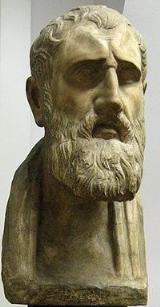
Stoicism
Overview
Hellenistic philosophy
Hellenistic philosophy is the period of Western philosophy that was developed in the Hellenistic civilization following Aristotle and ending with the beginning of Neoplatonism.-Pythagoreanism:...
founded in Athens
Athens
Athens , is the capital and largest city of Greece. Athens dominates the Attica region and is one of the world's oldest cities, as its recorded history spans around 3,400 years. Classical Athens was a powerful city-state...
by Zeno of Citium
Zeno of Citium
Zeno of Citium was a Greek philosopher from Citium . Zeno was the founder of the Stoic school of philosophy, which he taught in Athens from about 300 BC. Based on the moral ideas of the Cynics, Stoicism laid great emphasis on goodness and peace of mind gained from living a life of virtue in...
in the early . The Stoics taught that destructive emotions resulted from errors in judgment, and that a sage
Sage (Sophos)
In the Symposium, Plato draws a distinction between a philosopher and a sage . The difference is explained through the concept of love, which lacks the object it seeks. Therefore the philosopher does not have the wisdom he or she seeks. The sage, on the other hand, does not love, or seek, wisdom...
, or person of "moral and intellectual perfection," would not suffer such emotions.
Stoics were concerned with the active relationship between cosmic determinism
Determinism
Determinism is the general philosophical thesis that states that for everything that happens there are conditions such that, given them, nothing else could happen. There are many versions of this thesis. Each of them rests upon various alleged connections, and interdependencies of things and...
and human freedom, and the belief that it is virtuous
Virtue
Virtue is moral excellence. A virtue is a positive trait or quality subjectively deemed to be morally excellent and thus is valued as a foundation of principle and good moral being....
to maintain a will
Prohairesis
Prohairesis is a fundamental concept in the Stoic philosophy of Epictetus. It represents the choice involved in giving or withholding assent to impressions. The use of this Greek word was first introduced into philosophy by Aristotle in the Nicomachean Ethics...
(called prohairesis
Prohairesis
Prohairesis is a fundamental concept in the Stoic philosophy of Epictetus. It represents the choice involved in giving or withholding assent to impressions. The use of this Greek word was first introduced into philosophy by Aristotle in the Nicomachean Ethics...
) that is in accord with nature.
Unanswered Questions
Discussions

